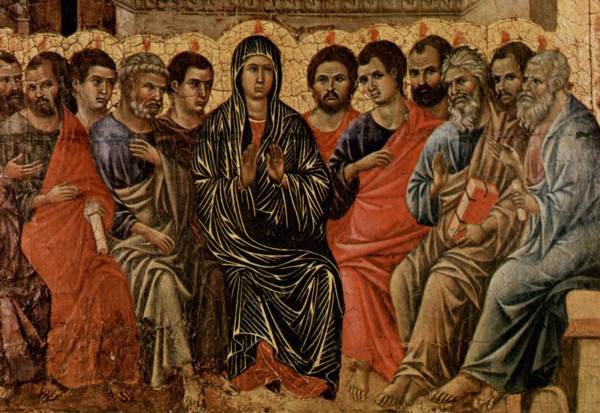Debunking the Conspiracy Theory: 7 Arguments Why Jesus’ Disciples Did Not Lie
by Dr. Peter Kreeft
Filed under The Resurrection
NOTE: Christians around the world celebrated Good Friday and Easter last week, which commemorate the death and resurrection of Jesus Christ. Thus we began a six-part series on these events by Dr. Peter Kreeft in which he examines each of the plausible theories attempting to explain what happened to Jesus at the end of his life, particularly whether he rose from the dead.
Part 1 - 5 Possible Theories that Explain the Resurrection of Jesus
Part 2 - Rejecting the Swoon Theory: 9 Reasons Why Jesus Did Not Faint on the Cross
Part 3 - Debunking the Conspiracy Theory: 7 Arguments Why Jesus’ Disciples Did Not Lie
Part 4 - Refuting the Myth Theory: 6 Reasons Why the Resurrection Accounts are True
Part 5 - Real Visions: 13 Reasons the Disciples Did Not Hallucinate
Part 6 - (Coming soon!)
On Monday we looked at the so-called "swoon" theory, which suggests Jesus didn't really die on the cross. But supposing he did actually die, why couldn't the disciples have made up the whole story about his resurrection? Here are seven reasons why:
(1) Blaise Pascal gives a simple, psychologically sound proof for why this is unthinkable:
"The apostles were either deceived or deceivers. Either supposition is difficult, for it is not possible to imagine that a man has risen from the dead. While Jesus was with them, he could sustain them; but afterwards, if he did not appear to them, who did make them act? The hypothesis that the Apostles were knaves is quite absurd. Follow it out to the end, and imagine these twelve men meeting after Jesus' death and conspiring to say that he has risen from the dead. This means attacking all the powers that be. The human heart is singularly susceptible to fickleness, to change, to promises, to bribery. One of them had only to deny his story under these inducements, or still more because of possible imprisonment, tortures and death, and they would all have been lost. Follow that out." (Pensees, 322)
The "cruncher" in this argument is the historical fact that no one, weak or strong, saint or sinner, Christian or heretic, ever confessed, freely or under pressure, bribe or even torture, that the whole story of the resurrection was a fake, a lie, a deliberate deception. Even when people broke under torture, denied Christ, and worshiped Caesar, they never let that cat out of the bag, never revealed that the resurrection was their conspiracy. For that cat was never in the bag. No Christians believed the resurrection was a conspiracy; if they had, they wouldn't have become Christians.
(2) If they made up the story, they were the most creative, clever, intelligent fantasists in history, far surpassing Shakespeare, or Dante, or Tolkien. Fisherman's "fish stories" are never that elaborate, that convincing, that life-changing, and that enduring.
(3) The disciples' character argues strongly against such a conspiracy on the part of all of them, with no dissenters. They were simple, honest, common peasants, not cunning, conniving liars. (They weren't even lawyers!) Their sincerity is proved by their words and deeds. They preached a resurrected Christ and they lived a resurrected Christ. They willingly died for their "conspiracy." Nothing proves sincerity like martyrdom. The change in their lives from fear to faith, despair to confidence, confusion to certitude, runaway cowardice to steadfast boldness under threat and persecution, not only proves their sincerity but testifies to some powerful cause of it. Can a lie cause such a transformation? Are truth and goodness such enemies that the greatest good in history—sanctity—has come from the greatest lie?
Use your imagination and sense of perspective here. Imagine twelve poor, fearful, stupid (read the Gospels!) peasants changing the hard-nosed Roman world with a lie. And not an easily digested, attractive lie either. St. Thomas Aquinas says:
"In the midst of the tyranny of the persecutors, an innumerable throng of people, both simple and learned, flocked to the Christian faith. In this faith there are truths proclaimed that surpass every human intellect; the pleasures of the flesh are curbed; it is taught that the things of the world should be spurned. Now, for the minds of mortal men to assent to these things is the greatest of miracles....This wonderful conversion of the world to the Christian faith is the clearest witness....For it would be truly more wonderful than all signs if the world had been led by simple and humble men to believe such lofty truths, to accomplish such difficult actions, and to have such high hopes." (Summa Contra Gentiles, I, 6)
(4) There could be no possible motive for such a lie. Lies are always told for some selfish advantage. What advantage did the "conspirators" derive from their "lie" ? They were hated, scorned, persecuted, excommunicated, imprisoned, tortured, exiled, crucified, boiled alive, roasted, beheaded, disemboweled and fed to lions—hardly a catalog of perks!
(5) If the resurrection was a lie, the Jews would have produced the corpse and nipped this feared superstition in the bud. All they had to do was go to the tomb and get it. The Roman soldiers and their leaders were on their side, not the Christians'. And if the Jews couldn't get the body because the disciples stole it, how did they do that? The arguments against the swoon theory hold here too: unarmed peasants could not have overpowered Roman soldiers or rolled away a great stone while they slept on duty.
(6) The disciples could not have gotten away with proclaiming the resurrection in Jerusalem-same time, same place, full of eyewitnesses—if it had been a lie. William Lane Craig says,
"The Gospels were written in such a temporal and geographical proximity to the events they record that it would have been almost impossible to fabricate events....The fact that the disciples were able to proclaim the resurrection in Jerusalem in the face of their enemies a few weeks after the crucifixion shows that what they proclaimed was true, for they could never have proclaimed the resurrection (and been believed) under such circumstances had it not occurred." (Knowing the Truth About the Resurrection, chapter 6)
(7) If there had been a conspiracy, it would certainly have been unearthed by the disciples' adversaries, who had both the interest and the power to expose any fraud. Common experience shows that such intrigues are inevitably exposed (Craig, ibid).
In conclusion, if the resurrection was a concocted, conspired lie, it violates all known historical and psychological laws of lying. Such a lie is, then, as unscientific, unrepeatable, unique, and untestable as the resurrection itself. But unlike the resurrection, it is also contradicted by things we do know (the above points).
On Friday, we'll examine the "myth" theory, perhaps the most common hypothesis among non-Christians today.
Related Posts
Note: Our goal is to cultivate serious and respectful dialogue. While it's OK to disagree—even encouraged!—any snarky, offensive, or off-topic comments will be deleted. Before commenting please read the Commenting Rules and Tips. If you're having trouble commenting, read the Commenting Instructions.













